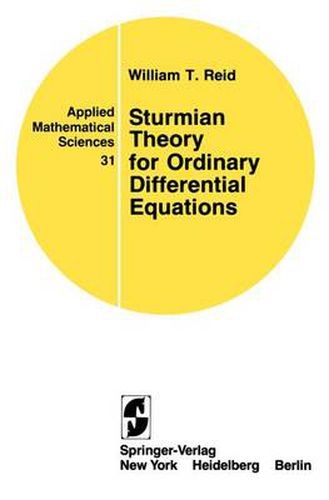Sturmian Theory for Ordinary Differential Equations
William T. Reid

Sturmian Theory for Ordinary Differential Equations
William T. Reid
This title is printed to order. This book may have been self-published. If so, we cannot guarantee the quality of the content. In the main most books will have gone through the editing process however some may not. We therefore suggest that you be aware of this before ordering this book. If in doubt check either the author or publisher’s details as we are unable to accept any returns unless they are faulty. Please contact us if you have any questions.
A major portion of the study of the qualitative nature of solutions of differential equations may be traced to the famous 1836 paper of Sturm [1), (here, as elsewhere throughout this manuscript, numbers in square brackets refer to the bibliography at the end of this volume), dealing with oscilla- tion and comparison theorems for linear homogeneous second order ordinary differential equations. The associated work of Liouville introduced a type of boundary problem known as a Sturm-Liouville problem , involving, in particular, an introduction to the study of the asymptotic behavior of solu- tions of linear second order differential equations by the use of integral equations. In the quarter century following the 1891 Gottingen dissertation [1) of Maxime Bacher (1867-1918), he was instru- mental in the elaboration and extension of the oscillation, separation, and comparison theorems of Sturm, both in his many papers on the subject and his lectures at the Sorbonne in 1913-1914, which were subsequently published as his famous Leaons sur Zes methodes de Sturm [7).
This item is not currently in-stock. It can be ordered online and is expected to ship in 7-14 days
Our stock data is updated periodically, and availability may change throughout the day for in-demand items. Please call the relevant shop for the most current stock information. Prices are subject to change without notice.
Sign in or become a Readings Member to add this title to a wishlist.


